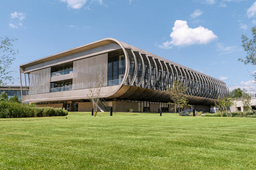Explore the interface of physics and biology at HFSP’s Frontier Workshop

As biochemists you already think in cross-disciplinary terms. Wouldn’t you like to broaden your horizons even more and partner with physicists to pioneer some of the most ground-breaking, next-generation discoveries in the life sciences?
In May, the Human Frontier Science Program (HFSP) will host its first Frontier Workshop – “Frontier Science at the Interface of Physics and Biology” – in partnership with the Université de Strasbourg to bring early career scientists together with world-renowned innovators in this field.
The three-day workshop will be held 13–15 May 2024, Collège Doctoral Européen, Université de Strasbourg, Strasbourg France. To submit an abstract or register to attend visit the HFSP website. Deadline for abstracts is 15 March 2024; deadline to register to attend is 30 April 2024.
Why Physics, Why Now?
HFSP has always worked at the outermost edge of frontier life sciences and through its new 2024-2032 strategy has committed to further expanding the horizons of cross-disciplinary research and opening channels for truly creative scientists through a series of Frontier Workshops.
Cross-disciplinary research coupling biology and physics investigates some of the most fundamental biological knowledge: the mechanics of molecules, how communities of bacteria organize themselves and evolve, and the development of networks of thousands of neurons in the brain. These areas represent core aspects of life sciences and offer exceptional areas for deep investigation to understand and manipulate living systems. The work ahead spans a wide range of scales from the most microscopic and molecular to comprehending whole ecosystems and their shared boundaries. Much as the early 20th century saw an explosion of physics-based discoveries heralding new frontiers in science, today’s research in the life sciences has spurred many to call the 21st Century “The Age of Biology.”
HFSP has emphasized integrative approaches to life science research since the early 2000’s by requiring interdisciplinary teams to apply for Research Grants and by offering Cross-Disciplinary Fellowships for PhD students in physics, chemistry, and other disciplines to do postdoctoral research in a biological context. These early efforts culminated in an international symposium in 2017 held in Lisbon, Portugal, focused on stimulating more successful cross-disciplinary collaborations.
During this event, participants revealed they face tremendous barriers – especially among young researchers – in working outside traditional disciplinary boundaries. Career pressures and incentives tilted toward short-term results and advancements that discourage physicists, mathematicians, and computer scientists from entering biology, and likewise, prevent life scientists from delving into the physical, structural, and quantitative realms of their subjects. Yet, the interface where physics and biology meet represents a powerful opportunity to investigate new territory, and HFSP is committed to supporting scientists with the courage to forge new channels and bridge boundaries.
Collaboration with the Université de Strasbourg
The Université de Strasbourg is also committed to cross-disciplinary research and is home to fifteen interdisciplinary institutes across a broad range of fields and thematic priorities. Launched in January 2021, the Interdisciplinary thematic institutes (ITI) are at the heart of the development strategy of the Université de Strasbourg and are a major element in the overhaul of its research and training landscape.
This spring the university plans to launch a new type of institution dedicated to facilitating collaboration by creating channels for scientists to share ideas, build trust, familiarize themselves with people of other cultures, languages, and approaches. The “Centre for Frontier Science” will offer two components: incubators and platforms. The incubators will offer an intellectual atmosphere conducive to stimulating new scientific questions and engaging scientists to form collaborations. The platforms will provide training experience outside of a scientist’s main discipline, including access to research laboratories.
Fusion Science!
HFSP and the Université de Strasbourg have partnered to invite you to what will surely be an intellectually thought-provoking forum as well as a superb networking event. If you want to embark on a truly exploratory journey at the frontiers of science, take the first step and register!
You can look forward to listening to these keynote speakers and many more:
- Eric Wieschaus, evolutionary biologist, Princeton University, Nobel Prize in Physiology or Medicine, 1995
- Bill Bialek, theoretical biophysicist, Princeton University, Max Delbruck Prize, American Physical Society 2017
- Tony Hyman, cell biologist, Max Planck Institut of Molecular Biology and Genetics, Nakasone Award Winner 2021
- Frank Jülicher, biophysicist, Max-Planck-Institutem for the Physics of Complex Systems and Technical University of Dresden, 2023 IUPAP Medal for the Physics of Life
- Claudia Bonfio, biomolecular scientist, Institute of Supramolecular Science and Engineering Institute, University of Strasbourg
Vist the HFSP events page for more details.
Photo by guillaume journet on Unsplash





Join the FEBS Network today
Joining the FEBS Network’s molecular life sciences community enables you to access special content on the site, present your profile, 'follow' contributors, 'comment' on and 'like' content, post your own content, and set up a tailored email digest for updates.